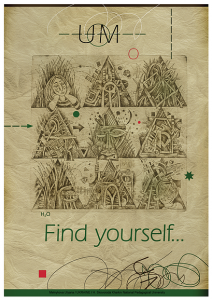Dr. Lila Moore
ARA (Advanced Research Associate) at the Planetary Collegium,
The I-Node, School of Art & Media, University of Plymouth

Fields of Origin (2015)
Novel forms and ideas arise unexpectedly from unknown or previously unsuspected origin. Being new and full of mysterious possibilities, they could impact consciousness, nature and culture, similar to viral memes and bacteria. Their revolutionary traits may periodically pose a threat to the dominant order, hence, they get tracked down and uprooted to stop them from spreading. Yet, their point of origin, embedded in morphic fields, retains their memory and formula. Hidden within the recesses of space-time, they await for as long as it may take for a morphic resonance, a signal that will herald their next manifestation in nature.
The Wandering Jew poses a threat to civilisation with his anarchic disregard of boundaries. Although elevated to the status of a world reformer and artistic nobility in Gostav Courbet’s Meeting and other works, the transformed outsider was publicly ridiculed. Prevalent in European folklore, the archetype has been associated with supernatural creatures that dwell in the twilight zone between reality and magic, the visible and invisible, the mortal and immortal. The golden plover, shown in the poster, according to a Lancashire tradition, embodies the Wandering Jew with its eerie whistling that strikes fear in the human heart. Resembling migrating birds, he was doomed to wander endlessly. The unnaturalness of his wanderings corresponded with all other abnormal births and entities which betrayed their master-maker and manipulated their initial design. Nowadays wandering has taken a different route. It has been reformed by the wandering quality of the Internet. Through virtual, vegetal and noetic technologies, wandering is spreading to the unregulated field of consciousness where the alien, mystic and visionary transmute with nature.
The golden plover inspired the concept of The Guinness Book of Records as the faster game bird in Europe. It became associated with extraordinary achievements that exceed conventional capacities. The bird as a metaphor of unlimited abilities and flights of the imagination corresponds, in this visual depiction, with Hypnos’ wings of the mind. The divine generator of altered state of consciousness is syncretically positioned by a reference to a monolith (2001: Space Odyssey).
The woman’s selves offer the elixir of the soul in a ritual that activates odysseys in fields of photons, memory, and impulse. The jars are ancient but the liquid inside them evolves the structures of realities as the screens that bind them disintegrate. Free to flow everywhere, the cybernetic monoliths of evolution beckon in the field to the wanderers.
info:www.i-node.org





